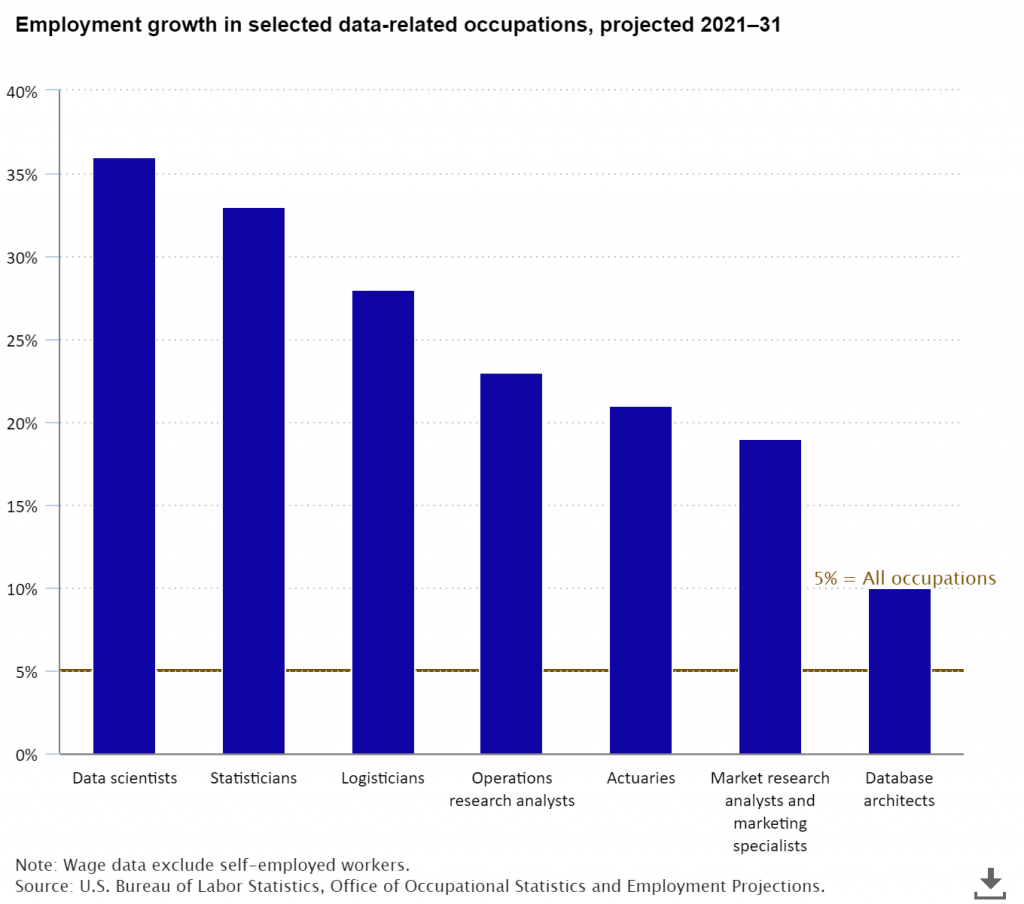Are you looking for some interesting STEM careers? This is definitely a prime time to build a career in STEM, given its increasing popularity. Technology is at the forefront, driving change and innovation in all fields. With a boost in STEM fields, there is also a demand for more STEM majors.
STEM programs focus on Science, Technology, Engineering, and Mathematics. They emphasize hands-on learning, problem-solving skills, and fostering innovation in these fields to prepare you for various technical and analytical roles in the modern world.
If you’re a STEM major, you have a lot of options to choose from, as STEM specialists are needed in almost every industry. In 2024, the most popular STEM majors will be based on artificial intelligence, data analysis, information technology, and healthcare, among other fields.
Popular STEM Careers in 2024
Let’s take a look at some of the more popular STEM majors and careers that will be at the forefront in 2024.
1. Cybersecurity Professional
Cybersecurity professionals are essential for safeguarding digital infrastructure and combating evolving cyber threats. With cybersecurity risks on the rise, every organization wants to protect its digital assets from these attackers. As a result, there is a growing need for cybersecurity specialists to protect organizations’ data from hackers.
Information security analysts, in particular, are in high demand, with their role evolving beyond traditional IT boundaries to encompass broader aspects of organizational safety and risk management.
Becoming a cybersecurity professional involves a blend of education, skill development, and practical experience. Recruiters look for graduates who can demonstrate working knowledge in cybersecurity fundamentals, network security, programming, risk assessment, cloud security, and incident response.
To get started with a career as a cybersecurity professional, a bachelor’s degree in cybersecurity, computer science, information technology, or a related STEM field is a necessary requisite. Equally important is consistent skill development and staying abreast of the latest threats and security technologies.
Obtaining industry-recognized certifications like Certified Information Systems Security Professional (CISSP), Certified Ethical Hacker (CEH), or CompTIA Security+ goes a long way toward enhancing your employability and demonstrating your expertise.
2. AI and Machine Learning (ML) Engineers
Designing and building AI algorithms is becoming increasingly important due to the continuous advancements in AI technology. And 2024 looks like the year when opportunities for AI and ML engineers will truly explode.
To become an AI and ML engineer, a strong foundation in computer science, mathematics, and statistics is crucial, as is a bachelor’s degree in a field like computer science or data science. Pursuing an advanced degree like a master’s or PhD will also be highly beneficial and can help you move on to more complex roles.
Beyond a bachelor’s degree, proficiency in programming languages such as Python, R, Java, and C++ is essential for developing and implementing AI models and algorithms. Additionally, skills in data analysis, statistical methods, and data visualization are important for preparing and interpreting data.
Creating robust AI systems requires knowledge of software development practices, including design patterns, software architecture, and testing methodologies, as well as familiarity with AI and machine learning frameworks like TensorFlow, Keras, or PyTorch.
A career in AI and machine learning, especially in 2024, requires a blend of formal education, practical experience, and ongoing learning to stay abreast of the latest developments in this dynamic field.
3. Clinical Data Manager
In a post-COVID world, STEM careers in healthcare are continuing to rise in popularity. For example, clinical data managers–someone who manages and analyzes medical data to improve patient care and outcomes–are very much in demand in clinics and hospitals across the country.
To become a clinical data manager, one needs to pursue and obtain a bachelor’s degree in life sciences, biostatistics, or a related field. Some positions might require candidates to have a master’s degree, especially for advanced roles.
A bachelor’s degree program provides essential knowledge in clinical data management, including understanding of clinical trial processes and data management principles, data collection, analysis, and reporting. These programs also allow students to develop the necessary technical skills, like proficiency in database management software, statistical analysis tools, and data coding systems used in clinical research.
Those wanting to pursue a career in clinical data management will need to keep up-to-date with regulatory knowledge. This includes a familiarity with regulatory guidelines and standards such as Good Clinical Practice (GCP) and FDA regulations. Obtaining professional certifications, like the Society for Clinical Data Management (SCDM) certification, can greatly enhance career prospects.
4. Genetics Nurse
Genetic nursing is a new and novel STEM career that has emerged lately in the healthcare industry. In a nutshell, a genetics nurse specializes in genetic healthcare, playing a multifaceted role that combines nursing skills with specialized knowledge in genetics to provide patient care, education, and support related to genetic conditions.
Genetics nurses provide direct care to patients with genetic disorders or at risk for inherited conditions. They also offer genetic counseling to patients and their families, explaining the risks, implications, and nature of genetic disorders.
Along with assessing the risk of genetic diseases in patients and their families, genetics nurses also engage in research related to genetics, advocating for patients’ needs, and ethical considerations in genetic healthcare.
To become a genetics nurse, one must first pursue and obtain a Bachelor of Science in Nursing (BSN) degree. The next step is to pass the NCLEX-RN exam to become a Registered Nurse (RN). Students should look to gain clinical experience in fields related to genetics, such as oncology, pediatrics, or obstetrics.
Additional coursework and training in genetics and genomics is always encouraged. Some nurses opt to pursue a master’s or doctoral degree with a focus on genetics. One to consider is obtaining certification through the Genetic Nursing Credentialing Commission (GNCC), such as the Advanced Genetics Nursing (AGN) credential.
5. Cloud Architect
Cloud architects are already in high demand, as they are responsible for designing and constructing cloud-based infrastructure and applications. With the widespread adoption of cloud technology, their expertise has become indispensable in meeting the evolving needs of organizations relying on efficient and scalable digital solutions.
This role involves a deep understanding of cloud services like AWS, Azure, and Google Cloud, as well as skills in network architecture and cloud security. To pursue a career as a cloud architect, one must obtain a bachelor’s degree in computer science, information technology, or a related field. Along with gaining proficiency in cloud services, students will also get hands-on experience in specialty areas like network administration, systems engineering, or database management.
Apart from earning a bachelor’s degree, obtaining certifications like AWS Certified Solutions Architect or Microsoft Certified: Azure Solutions Architect Expert is also highly encouraged. Cloud architects play a key role in guiding organizations through digital transformations and will test your skills in project management, communication, and leadership.
6. Green Computing Specialist
As industry sectors and organizations increase their focus on sustainability, professionals capable of designing energy-efficient data centers and reducing the carbon footprint of IT will be increasingly important for companies to hire. This is where green computing specialists come in.
A green computing specialist focuses on creating and maintaining environmentally sustainable and energy-efficient computing processes. This includes designing energy-efficient data centers, reducing electronic waste, and improving the overall carbon footprint of IT operations.
To pursue a career in green computing, one must first get a degree in either computer science, environmental science, or a similar field. The right bachelor’s degree program will help you gain knowledge in sustainable practices, energy efficiency, and environmental impact assessment.
Pursuing a bachelor’s degree will also help you develop skills in areas like energy-efficient hardware, software optimization, and cloud computing – all of which are essential when applying for a green computing job. You can enhance your qualifications by obtaining certifications related to green IT and sustainability.
As the world shifts towards environmentally conscious technology solutions in 2024, the role of green computing specialists will emerge as highly sought after.
7. Software Developers and Engineers
With the continuous evolution of software applications and platforms, the demand for skilled software developers, full-stack developers, and DevOps engineers remains robust. Second only to actuaries, software developers have high salaries and the outlook for jobs is positive at a solid 22% from 2020-2030. These professionals play a pivotal role in designing, developing, and maintaining software solutions across industries.
To join this career, you would typically need a bachelor’s degree in computer science, software engineering, or a related field. This will get you entry-level roles. Additional certifications, such as those related to specific programming languages or platforms, can be beneficial. Advanced degrees, like a master’s in computer science, are advantageous for specialized or senior positions.
8. Data Scientists and Analysts
As data becomes increasingly central to business decision-making and innovation, the demand for data scientists, data analysts, and business intelligence analysts continues to grow. These roles focus on deriving insights from data to drive strategic initiatives and operational efficiencies.
Your journey toward becoming one would typically require getting a bachelor’s degree in data science, statistics, computer science, or a related field. Your coursework should include statistics, data analysis, and programming. Many employers prefer candidates with a master’s or Ph.D. for advanced roles. Certifications in data analytics tools and platforms, such as Python or R, can also enhance employability.

9. Augmented Reality (AR) / Virtual Reality (VR) Developer:
AR/VR developers create immersive virtual experiences or overlay digital information onto the real world. They design, develop, and optimize AR/VR applications for various industries, including gaming, healthcare, education, and manufacturing.
A bachelor’s degree in computer science, game design, multimedia arts, or a related field is typically required to enter this field. Specialized training in AR/VR development platforms and tools (e.g., Unity, Unreal Engine) is essential.
Some skills that you need include proficiency in AR/VR development tools and platforms, strong programming skills (e.g., C#, C++, Python), an understanding of 3D modeling and animation, creativity, and a keen interest in leveraging technology to create immersive experiences.
These careers reflect the ongoing advancements and innovations in STEM fields, offering exciting opportunities for those passionate about leveraging technology to drive change and create meaningful outcomes.
10. Immunology
Immunology is in demand due to its critical role in understanding and addressing diseases, including infectious diseases, autoimmune disorders, and cancer, driving advancements in diagnostics, treatments, and vaccine development.
Immunology is the study of the immune system, including how it functions, interacts with pathogens, and contributes to health and disease. This field explores topics such as immune responses to infections, autoimmune diseases, cancer immunotherapy, and vaccine development.
To enter this field requires a bachelor’s degree in immunology, biology, biochemistry, or a related field. Advanced positions, research opportunities, or academic roles often necessitate a master’s or Ph.D. degree in immunology or a specialized area within the immunological sciences.
11. Robotics engineering
There is now an increasing focus on robotics, particularly within industries such as manufacturing, healthcare, and logistics. This makes it a good time to pursue a career in robotic engineering. This field is poised for significant advancements and innovation.
Robotics engineering focuses on designing, building, and operating robots for various applications. It blends mechanical, electrical, and computer engineering principles to create autonomous or human-guided robotic systems for tasks in industries like manufacturing, healthcare, and space exploration.
Generally, entry-level positions require a bachelor’s degree in mechanical engineering, electrical engineering, robotics engineering, or a related field. Advanced positions often require a master’s degree or further specialized training in robotics.
Related: Day in the Life of a Robotics Technician
Why Choose These Trending STEM Careers?
STEM majors can be challenging, but the effort you invest in pursuing one of these degrees can set you up for a very fulfilling career.
Here are a few compelling reasons to choose these trending STEM careers:
1. High Demand: STEM fields are experiencing rapid growth, leading to increased job opportunities and career stability.
2. Competitive Salaries: Many STEM roles offer competitive compensation packages due to the specialized nature of the work.
3. Problem-Solving and Creativity: STEM disciplines cultivate critical thinking, problem-solving abilities, and creativity, empowering individuals to tackle complex problems and develop innovative solutions.
4. Continuous Learning: The evolving nature of STEM fields ensures that professionals are constantly learning and adapting to new challenges.
5. Global Opportunities: STEM skills are universally recognized, opening doors to international job markets and collaborations.
6. Influence and Impact: Professionals in trending STEM careers have the opportunity to contribute to groundbreaking projects and solutions that shape the future.
7. Networking: Engaging in trending STEM fields allows for connections with like-minded professionals, leading to collaborations and knowledge sharing.
8. Meaningful Work: Contributing to groundbreaking research, solving complex problems, and making advancements that have a positive impact on society can be deeply fulfilling.
9. Versatility: STEM skills are transferable across various roles and industries, providing flexibility and the ability to pivot within the field as interests evolve.
In summary, these trending STEM careers offer a combination of innovation, impact, and growth potential, making them attractive options for those passionate about shaping the future and making a meaningful difference in their respective fields.
Related: Popular STEM Majors That Lead to Solid Careers.
Conclusion
The outlook for STEM careers in 2024 is highly positive, with several new areas of expertise experiencing significant growth and becoming hotbeds for rising career opportunities. The key to making one of these careers your own is to get a bachelor’s degree that is relevant to the career you want to pursue. The right bachelor’s degree program will arm you with the relevant knowledge, skills, and practical expertise required to apply for and succeed in STEM jobs. It will not only act as a launchpad for your career but for future learning opportunities as well.
Frequently Asked Questions (FAQs)
Essential skills for STEM careers include problem-solving, critical thinking, analytical skills, technical proficiency (e.g., programming, data analysis), communication skills, collaboration, adaptability, and a strong foundation in mathematics and science concepts
Future trends in STEM careers include
-Artificial intelligence (AI) and machine learning
-Biotechnology and genomics.
-Sustainability and renewable energy solutions
-Cybersecurity roles are expanding.
-Technology integration in healthcare, like telemedicine,
As so many new fields emerge, interdisciplinary collaboration and continuous learning are shaping the evolving STEM landscape



